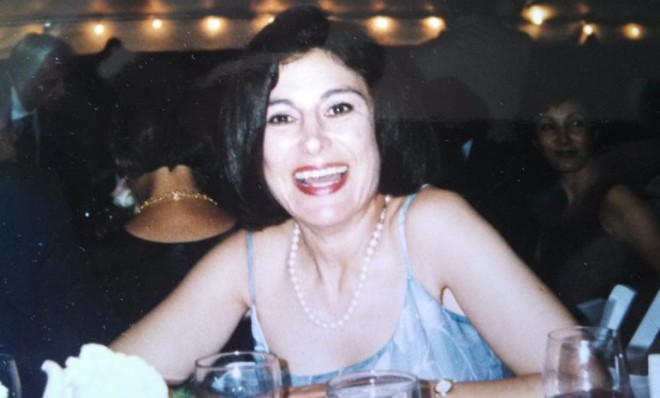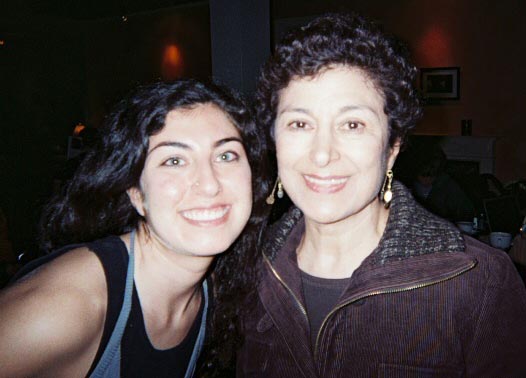Learning to live without my mother
Three years ago, I lost my mom to cancer. Life has gone on, it's just different now.

A free daily email with the biggest news stories of the day – and the best features from TheWeek.com
You are now subscribed
Your newsletter sign-up was successful
It had been a long winter of epic storms. Spring was coming.
It was that sweet time in D.C. when the trees erupt in an annual pink-blossomed explosion. But I was inside strong-arming my mother, bullying her to put on a dress and take a drive with her brother and sister.
"You're beautiful," I said.
The Week
Escape your echo chamber. Get the facts behind the news, plus analysis from multiple perspectives.

Sign up for The Week's Free Newsletters
From our morning news briefing to a weekly Good News Newsletter, get the best of The Week delivered directly to your inbox.
From our morning news briefing to a weekly Good News Newsletter, get the best of The Week delivered directly to your inbox.
"I am?"
"You are."
"Oh, Nedu. I'm not," she said.
My mother was dying. And she was all bony elbows, jutting clavicles, and sunken cheekbones.
A free daily email with the biggest news stories of the day – and the best features from TheWeek.com
Still, she was as beautiful as she was tired and — God, my poor Mom — that day she was exhausted. She would have been more comfortable sleeping with a fresh Dilaudid patch, but I was determined to cheer up a woman who, whether we knew it or not, had only a week left to live.
That day, I wheeled Mom into the bathroom. I brushed her hair. Changed her bandages. Doled out pills. I rubbed lotion over her chest and back, down her arms. I carefully applied a bit of lipstick and pinned her curls from her face.
For some reason, I thought that maybe after the makeup, my lectures, some jokes, Mom would feel better. That her one cloudy eye might clear up and she would hang on for a bit longer.
I thought that if she was happy, and the springtime was beautiful enough, she might not leave us. She might not be so tired and my family might have just a little more time together.
It was a perfect spring afternoon when my aunt and uncle helped Mom into the car. The three of them set off for what I remember as the last time they had together, just the three of them. It took a superhuman kind of control not to run after them, throw my arms around her neck, and beg her not to leave me behind for the afternoon — to beg her not to leave me ever.
Or maybe, I thought, she will come back happy, refreshed. Maybe all she needed was to get out of the house, to take a drive, to put on lipstick.
But it turns out that when a person is dying, it isn't a thing that springtime or family or lipstick can cheer into reverse.
The day after her drive, or maybe the day after the day after, I walked upstairs and saw Mom sleeping on the adjustable hospital bed set up in the living room. I looked over at my uncle reading on the couch and, suddenly it hit me just how incredibly, stupidly, laughably young and unprepared I really was for Life Without Her.
I crawled into the bed hospice had set up under the skylight. I started crying. Then the crying turned to weeping and the weeping turned to sobs. The world, and my grief, were too much. I was just a small little nothing of a human, and the whole dying Mom scenario felt kind of like the Universe was personally challenging me.
Then the sobs gave way to howls.
Mom's eyes, half-blind after years and years of cancer, flew open.
"Nedu," she said, her tone alarmed, her voice a whisper. "Who died?"
"No one, yet," I said.
We looked at each other and I laughed. And she laughed. And we held hands and kissed each other and she told me I was going to be okay.
"Mu, how much do you love me?" I asked.
"Nedu," she said. "I love you as big as the universe, as wide as the ocean and back, forever and always."
"Mu," I said. "I love you as big as the universe, as wide as the ocean, and back, forever and always."
That's when I knew, in that precise moment, that chapter of my life — one where I could always go home, where I got to be a daughter — was over.
That was the last moment I was mothered.
It's been three years since she left, and not one person has made me laugh like Mom. No one has made me as angry. Without her, no one has made me feel as safe or as loved as she could, as she did on that afternoon in the hospice bed.
And yet... I have learned there's a heady freedom that comes with the loneliness of being orphaned.
My mother, who spent her career as a remorseless editor, would have been startled that I have become a serious writer — and it's a career I might not have pursued if Mom was still alive. The uncertainty of the career would have had her concerned. She would have demanded that I spend more time being practical. There would have been liberally administered critiques and some loudly voiced concerns over my having "enough" talent to "make it." This would be, as it often was, a source of some tension between us.
But as the years pass, Mu's nitpicking voice fades. It is steadily and instinctively being replaced by my own.
And there is a little part of me that luxuriates in being in charge, not unlike the way people say that inmates celebrate when they are given the keys to the asylum.
I lost my Dad when I was young. An unfortunate series of events led to his execution, after a relatively lengthy imprisonment, at the hands of the Islamic Republic of Iran. I barely knew my father. I was a toddler when he was arrested and taken from us, and the grief followed me for years.
In the months leading up to Mom's death, I told myself that this time would be different. With Mom, I was determined to just spend an efficient amount of time being sad, followed by a contentment and inner peace. I would grieve, I thought, and then it would be over.
That's not how grief works.
Three years on, some days it's all I can do to wake up, walk the dog, do my job, laugh at jokes, have a moment, pay my bills, go to sleep, and get ready to do it all again.
Three years on, there is a steady monologue looped in my head: Do I have to be a grown-up forever? I feel broken. I want my Mom today. I want my Dad today. I'd like to go home today. What if I can't feel it all without folding in on myself completely?
I think all of this as I wait in line for coffee on Friday morning or as I get pump gas on a Wednesday after work or as I race to meet a Thursday deadline or while I have a quiet drink with friends on Monday night.
As I go about my day, Old Lady Grief tails me. As I get ready for bed, I say to the old bag: Go away. I don't want you.
I just want my Mom.

Neda Semnani is a freelance writer at work on her first book. She is the former Heard on the Hill columnist and the arts and culture reporter for CQ Roll Call. Her work has also appeared in the Washington City Paper, BuzzFeed, CityStream, and more.
-
 What are the best investments for beginners?
What are the best investments for beginners?The Explainer Stocks and ETFs and bonds, oh my
-
 What to know before filing your own taxes for the first time
What to know before filing your own taxes for the first timethe explainer Tackle this financial milestone with confidence
-
 The biggest box office flops of the 21st century
The biggest box office flops of the 21st centuryin depth Unnecessary remakes and turgid, expensive CGI-fests highlight this list of these most notorious box-office losers